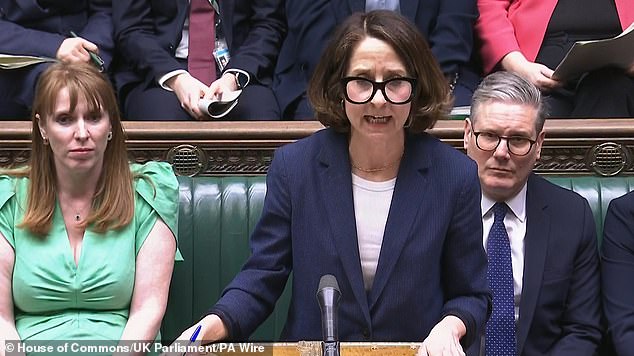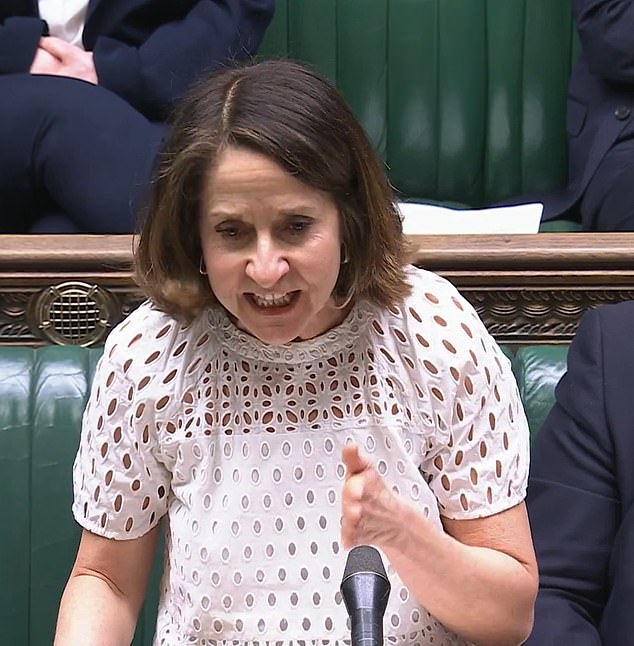Is that it? After promising radical reform of a welfare system that ‘trapped people in poverty’ and was ‘holding our country back’? After vowing to tackle the country’s insatiable appetite for health and sickness benefits?
After sowing so much angst about what might be in store on the Labour backbenches, whose default position is to claim any change (other than more dosh) heralds a return to the Victorian poorhouse?
After all that, Work and Pensions Secretary Liz Kendall could manage no more than a tinker here, a dabble there, and a promise of more money for a system already wallowing in it.
She tried to deflect criticism from her own side by deploying her angry, strident, anti-Tory voice. It was as tedious as it was unconvincing — and unnecessary. For, in reality, she had nothing to say to frighten the Labour horses (though some are pretty good at frightening themselves with all sorts of nonsense about the mythical impact of Kendall’s changes).
Let us remind ourselves of the scale of the problem. In January 2020, on the eve of the pandemic, 2.14 million adults with disabilities in England and Wales were eligible for a Personal Independence Payment (PIP), which helps those disabled claimants, whether working or not (most in receipt are not). By January this year the number had reached 3.66 million — a dramatic rise of 71 per cent in only five years.
There is no sign of a halt: PIP claims are rising by 1,000 a day. The cost is substantial. Before the pandemic, £14billion a year of taxpayers’ money went on PIPs. It is now £22billion. And forecast to be £34billion by the end of the decade.
Overall, the cost of sickness and incapacity benefits has risen from £46billion the year before the pandemic (2019) to £75billion in the current 2024/25 financial year — and projected to be over £100billion by 2030. That’s more than we currently spend on defence, police and courts combined.
No other prosperous nation has seen such a precipitous rise in health-related benefits paid to adults of working age. The workshy epidemic is a uniquely British phenomenon. A massive, costly problem requiring radical reforms. The Government promised ‘decisive action’.

Work and Pensions Secretary Liz Kendall, pictured today in the Commons alongside Sir Keir Starmer and Angela Rayner, could manage no more than a tinker here, a dabble there, and a promise of more money for a system already wallowing in it, writes Andrew Neil
Instead we were presented with a damp squib. Some restrictions on those eligible for PIPs, with more emphasis, rightly, on those with clear and severe disabilities, though not before next year. A new ‘right to try’: people on sickness payments can try going back to work without immediately losing all their benefits.
So far, so sensible. But it didn’t go nearly far enough. No vouchers for disability benefits to make sure the money is spent properly. No freezing of PIPs which, when combined with other benefits, makes it more sensible to live on welfare than seek work on the minimum wage.
No bottom up hard-headed review of all current claimants, reassessed on far stricter criteria, to weed out those gaming the system – advice on how to ‘cheat’ is freely available on various TikTok feeds – from those in genuine need.
Despite her underwhelming proposals Kendall still felt it necessary to sweeten the package for Labour backbenchers by announcing a rise in unemployment payments, a rise in the standard universal credit allowance and an extra £1billion to improve ‘pathways’ to work for her department which, if it increased its productivity and scrapped working from home, could manage that without extra money.
This being the Starmer government there was also plenty of jam tomorrow including yet another review, this one on the PIP assessment process, to report by 2027.
There will be a consultation on tougher rules for health-related benefits for those under 22 (almost 17 per cent of those in receipt of PIPs are under 30). Kendall unveiled not a firm policy package but what Whitehall calls a ‘green paper’ — a set of proposals up for examination and debate, which means it can be readily picked apart.
If government by review was the yardstick this would be the most successful British administration of modern times. It has become so because Labour did no serious thinking in opposition about important matters, including welfare. And, of course, it opportunistically opposed every half-hearted Tory attempt at welfare reform. Now it’s proposing measures it only recently argued against.
And for what? The Kendall package is calculated to save around £5billion a year by 2029-30 — a mere £5billion on health-related welfare payments forecast to be, as I said, over £100billion before the decade is out. Even the £5billion figure is being disputed.

The Kendall package is calculated to save around £5billion a year by 2029-30 – a mere £5billion on health-related welfare payments forecast to be over £100billion before the decade is out
No sooner had Kendall sat down than a well-financed army of lobbyists, charities and pressure groups — experts one and all at unpicking green papers — had waded in to water down what reforms there are. Even if they fail, it’s hardly a game-changer for Britain’s bloated welfare state. It’s turned out to be a modest exercise in fiscal arithmetic rather than a much-needed radical reform.
But it is convenient because 2029-30 is when, on current projections, Chancellor Rachel Reeves will fail to meet her self-imposed fiscal rule to pay for all current spending out of tax revenues (borrowing only to invest).
Reeves will be grateful for that modest saving, if it ever materialises, though it will still leave her looking for at least another £10billion in tax rises or spending cuts. We will find out how she manages that in her Spring Statement next Wednesday.
Meanwhile, our voracious welfare state will continue to consume resources on a grand scale, with ever more folks benefiting. Over 1.3 million are on the maximum PIPs payment of £9,500 a year (on top of other benefits) for a ‘disabling condition’, which is pretty widely defined, including not just drug and alcohol abuse but obesity. Just why giving cash to drug and alcohol addicts is wise is not clear. Nor why being overweight qualifies you for welfare.
Around 500,000 are on benefits for feeling anxious or depressed, which most of us go through at some stage, sometimes regularly, without thinking we have a call on the welfare state.
If you only know how to cook a meal in a microwave, find it hard to talk to other people and need help managing money, you can take almost £4,000 a year in a PIP. If you’re also scared of leaving the house or struggle to plan a journey, you can get an extra £1,500 a year.
Too stressed to talk to anybody and struggling with even simple decisions involving money? Then expect over £5,600 a year (not sure it’s a good idea to give folk who struggle to handle money more money, but there we are). Unable to walk over 200 yards without help? Say hello to a further £4,000 a year. A welcome boost for the local taxi company.
You can qualify for disability benefits with acne, eczema, constipation, food intolerance, cleft palate or lip and even bedwetting. Perhaps most ludicrous of all you can collect benefits if you claim to have Münchausen syndrome — pretending to be ill.
Admittedly, the numbers on benefits with these conditions is small. But it nevertheless suggests a welfare system that has lost the plot, is out of control — and unlikely to be brought to heel by Kendall’s milquetoast ‘reforms’, especially after they’ve been through the poverty-industry wringer.
Last weekend, I wrote in these pages that, just as only an anti-communist hardliner like President Richard Nixon could be trusted way back in the early 1970s to fly to China to begin a detente with Chairman Mao’s Marxist regime, so only Labour could really deliver radical welfare reform.
We were assured that’s what it was setting out to do. But, alas, the project has been aborted on take-off, the opportunity of a generation squandered. The whole country — not just those trapped in a life on benefits — will be the poorer for it.






